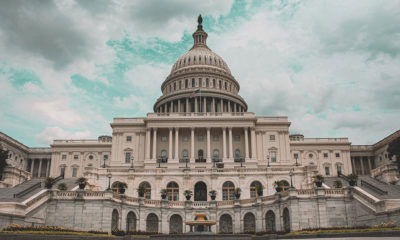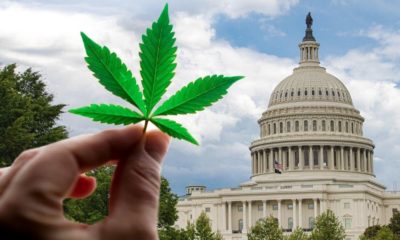
Politics
Congress Continues to Look at Making Federal Pot Prohibition Unenforceable
Amendment could stop federal interference with state cannabis laws, but would not address other key issues such as banking.
Once the evilest of all evils for a cannabis warrior, the federal Justice Department in recent years has slid way, way down the list of marijuana legalization and marijuana industry bogeymen. These days, more mortal threats — depending on the perspective — are coming from within the cannabis industry itself.
But just in case anyone was worried about a last-gasp flock of DEA helicopters, the Democratic-controlled Congress looks likely to ensure that the federal anti-weed brigade stays grounded permanently, at least when state-legal cannabis is concerned.
According to legalization advocates, the proposed budget amendment that would see Congress remove all Justice Department cash for enforcing federal prohibition against state-sanctioned cannabis operations, which cleared a House of Representatives committee on Tuesday and now heads to the full House for a vote, is “the most significant step that Congress has ever taken to end the failed and cruel policy of federal marijuana criminalization,” as NORML lobbyist Justin Strekal wrote in The Hill.
Maybe, but another way to look at the Blumenauer-McClintock amendment is as an anachronism, a reminder of bad times passed by. And meanwhile, the real action the industry needs now, like banking protections and interstate commerce, appears far less likely to find success.
The days when the Drug Enforcement Administration would stage a raid on a six-plant medical garden have long been over. The last time the feds caused significant havoc in cannabis was when Obama Administration U.S. attorneys shut down some state-legal dispensaries in California and forced others to spend untold amounts on legal fees and all this via sending registered letters. Under Donald Trump, the worst that the supposed public enemy number one, former Attorney General Jeff Sessions, was able to do was spook some more excitable weed people with some outlandish tough talk that he was ultimately unable or unwilling to back up and meanwhile, legalization continued to spread and the industry continued to expand dramatically.
The first time Congress cut federal Justice Department funding for the war on marijuana, also via a budget amendment, the effects were both immediate and significant. As a federal judge ruled in 2015, while delivering a stunning rebuke to the Justice Department, it meant that those Obama-era shutdown efforts had to end, immediately. And as long as the budget amendment kept getting renewed (it did), state-sanctioned cannabis operations were free to thrive and expand (they did).
This year’s version, named for U.S. Rep. Earl Blumenauer of cannabis-crazy Portland, Oregon, and U.S. Rep. Tom McClintock, a California Republican, would also keep the Justice Department away from recreational cannabis in the 11 states where the plant is available for adults in stores as well as all medical-marijuana operations in the 33 states where medical is legal.
As MJBizDaily reported late Tuesday, the House Rules Committee approved the amendment for passage by the full House on an 8-4 vote. Also approved and sent on to the full House for a vote was another weed-friendly amendment from Blumenauer. This one would bar the Justice Department from prosecuting Veterans Affairs doctors who recommend cannabis to their patients (though whether the VA will change its own policies and let doctors do that is another matter).
But budget amendments last only for a year and they only allow cannabis businesses to conduct business as normal, which is to say “business as a second-class citizen.”
Still awaiting approval, or in some cases even an honest hearing, are proposed laws that would allow cannabis businesses to use banks, be taxed like other businesses, not pay their taxes in cash, and ship their products across state lines without fear of reprisal from law-enforcement — something even hemp businesses enjoying Farm Bill “protections” can’t do.
That would be huge and that’s a trick that even high-powered connected lobbyists like former House Speaker John Boehner, now a cannabis stock-tip salesman, have yet to pull off.
TELL US, what changes in the cannabis industry would you like to see at the federal level?


























